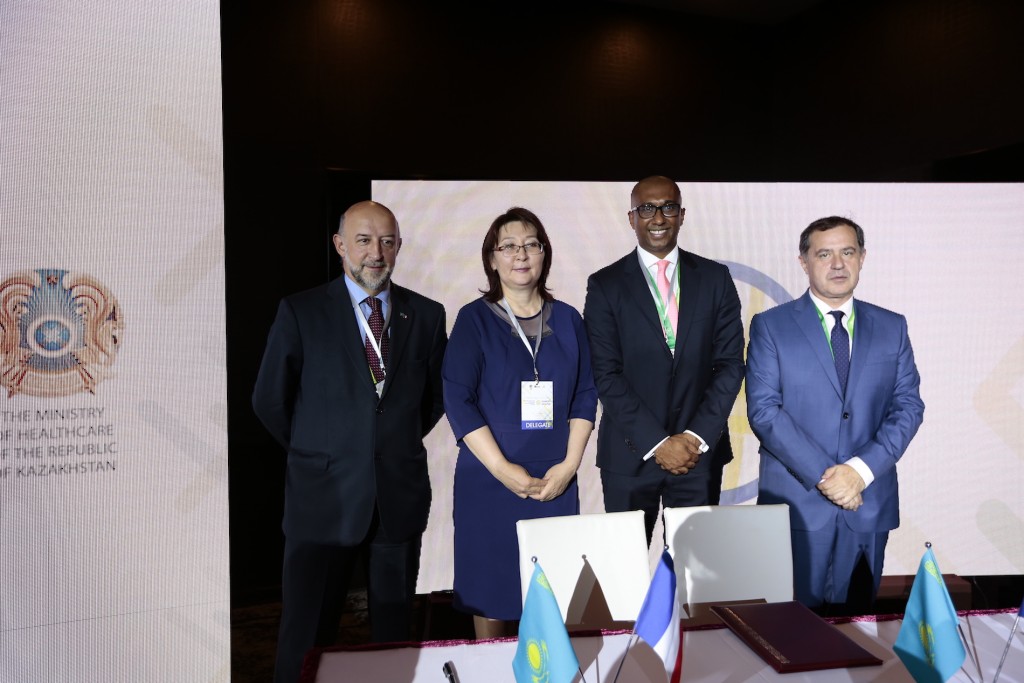ASTANA – The international conference “Modern Approaches in Managing Socially Significant Diseases. Diabetes Mellitus” addressed June 28 the prevalence and risk factors of chronic non-communicable diseases, in particular diabetes, reported the Kazakh Healthcare Ministry.
Speakers unveiled current data on the worldwide prevalence of diabetes, shared their expertise in implementing diabetes programmes and provided an overview of national policies and practices in disease prevention.
“The Ministry of Healthcare, in order to improve the quality of life and life expectancy of the population, carries out measures for the prevention, early detection and effective treatment of patients with diabetes mellitus,” said Minister Yelzhan Birtanov.
“Starting in 2011, the national programme for the early detection of type 2 diabetes was introduced and more than 1.5 million people over 40 years old are screened annually. Within the guaranteed volume of free medical care, all patients with diabetes mellitus are provided with a modern analogue of insulin and sugar-reducing drugs, insulin delivery means and self-monitoring means,” he added.
Birtanov summarised the effectiveness of the session.
“Today’s conference and exchange of international experience in the prevention, diagnosis and treatment of diabetes mellitus will be useful for all the participants and will allow everyone to learn about the latest achievements in diabetes. I hope that this meeting will become an effective professional platform for discussing the global problem, the growth of type 2 diabetes cases,” he said.
As part of the meeting, the Ministry of Healthcare signed a memorandum of understanding with Sanofi through 2019. The company, a worldwide healthcare leader, discovers, develops and distributes therapeutic solutions focused on patients’ needs, according to its website. Sanofi is organised into five global business units: Diabetes and Cardiovascular, General Medicines and Emerging Markets, Sanofi Genzyme, Sanofi Pasteur and Consumer Healthcare.
“Sanofi has been a reliable partner of the Ministry of Healthcare of Kazakhstan for many years,” said Sanofi Kazakhstan Chairperson of the Board Ranga Welaratne.
“We are pleased to support the organisation of an important international conference aimed at discussing the prevalence and risk factors of chronic non-communicable diseases. This conference, serving as an international platform for the exchange of experience, is an excellent opportunity for Kazakhstan’s medical community to obtain expert opinion from foreign specialists. We are further aiming at participating in joint projects with the Ministry of Healthcare designed to solve the most critical social and medical problems of the citizens of Kazakhstan, improve their quality of life and effectively develop public-private partnerships,” he added.
The event, held with the support of the ministry of healthcare, the French Embassy in Kazakhstan and Sanofi, included participation by international medical experts and representatives of the International Diabetes Federation (IDF) and World Health Organisation (WHO).
The IDF noted the incidence and prevalence of type 2 diabetes is increasing worldwide and the disease is an extremely topical issue affecting Kazakh health. According to Wilson and Jungner criteria, the screening method used for the last 40 years, type 2 diabetes is a disease where mass screening of the population is justified and valid, as it can be identified by simple available tests.
The results of NOMAD, an epidemiological study aimed at identifying the prevalence of type 2 diabetes and pre-diabetes among Kazakhstan’s adult population (20-79 years), were announced as part of the conference.
Type 2 diabetes starts to develop nine-12 years before the onset of clinical indicators and diagnosis. At the stage when symptoms are absent, there are effective ways to influence the disease’s development, both medicine-related and lifestyle-related.
Diabetes, one of society’s medical and social problems, is among the four non-communicable diseases that kill large numbers of people each year. It is ranked as a socially-significant disease in Kazakhstan requiring systematic solutions and state response measures.
